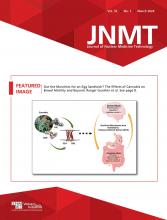Abstract
BACKGROUND: The ALSYMPCA trial of α-emitter Ra-223 in symptomatic bone predominant mCRPC reported Ra-223 median overall survival (OS) of 14.9 months versus 11.3 months OS for placebo (1). Subsequently reported “real world” experience with Ra-223 in smaller mCRPC patient cohorts appeared less successful(2-3). We decided to review our own Ra-223 experience at WVU. PATIENTS: Demographic, clinical and laboratory data, and all available images were reviewed in bone predominant mCRPC treated with Ra-223 at WVU. The number of bone metastases per patient as quantified. Standard descriptive statistics were used to study IRB-exempt, de-identified patient data. The primary end-point was patient overall survival (OS) after initiating Ra-223. RESULTS: Twenty four men received 98 infusions of Ra-223; 83%of these men were referred from outside WVU. Prior to first infusion, all 24 had received a total of 73 sequential combinations of androgen deprivation therapy (ADT); 68 courses of ADT (93%) preceded the first Ra-223 infusion. Before Ra-223, 19(79%) received docetaxel and 19 (79%) received 33 courses of radiation --24 courses targeting non-prostate sites. Eleven men (46%) completed all six planned Ra-223 infusions; 13 (54%) stopped early for clinical deterioration or death. Median OS from first Ra-223 infusion to last follow-up or death was 8.3 months (range 0-44 mos.) -- nearly 50% less than the ALSYMPCA results. Compared to ALSYMPCA, more WVU patients had received bisphosphonates and docetaxel, more had ECOG PS >2, more used opiates for pain, more had greater bone metastases burden, and more had lower hemoglobin, albumin, alkaline phosphatase, and PSA levels. CONCLUSION: While the science supporting the development and clinical use of Ra-223 is compelling, optimal clinical benefit will likely require earlier referral for Ra-223, before patients have exhausted most conventional therapies. At WVU, we found that our referred patients had practically all ADT, radiation, and cytotoxic therapy before starting Ra-223. A 2019 report from McMaster University using Ra-223 in 60 men with heavily pre-treated mCRPC also found a median OS of 8.2 months with only 42% completing all six treatment cycles, results almost identical to ours(2). Other studies confirmed that men with less advanced mCRPC, receiving the full course of Ra-223, had better OS(3). Now, we offer Ra-223 to men with symptomatic bone-predominant CRPC but we highly encourage earlier referral.







